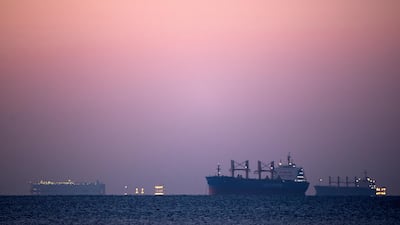Egypt is estimated to be losing about $16 million per day in revenue as the Suez Canal Authority has been unable to collect fees from vessels passing through the waterway, according to financial data company Refinitiv.
Ever Given, the 200,000 tonne ship carrying 20,000 containers, was partially refloated on Monday after high winds blew it off course on March 23, blocking a vital waterway for global trade. It is expected to take some time to clear a backlog of more than 400 vessels at either end of the waterway.
“Without transits for the past six days, the loss in revenue for the Suez Canal Authority and Egypt are in excess of $95m,” Ranjith Raja, head of Mena oil and shipping research at Refinitiv, said.
“Despite this morning’s great news on re-floating, the canal is still not passable and so this figure will inevitably grow. If the SCA is considering discounts for vessels affected by the blockage [this] will result in a further loss of revenue.”
A total of 369 ships are currently stranded on either side of the water channel, carrying a deadweight tonnage of 25 million – an 85 per cent increase on the amount that was stuck last Thursday. A further 85 ships are en route to join the jam before Wednesday, Refinitiv said.
Although the authority has managed to transit 100 ships in a single day, there are limitations related to the size of ships transiting and tidal factors on a given day.
“Considering container ships account for the majority of vessels waiting for transit, they are expected to cause a shock to the supply chain, specifically for the manufacturing and automobile sector which usually operate on the 'just-in-time' principle," Mr Raja said.
"This isolated incident is expected to have subsequent cost implications and delays" to consumer goods deliveries in Europe, the Middle East and Asia, he added.
Ships can take an alternate route around the Cape of Good Hope, but this can take an extra 10 days and add up to $400,000 in fuel costs alone for a large container vessel or a super tanker, the report said.
The current blockage is unlikely to have a significant impact on oil markets, as only 10 per cent of global oil trade passes through the canal, oil demand remains relatively weak and there are ample reserves both in Asia and the West, Refinitiv's report said.
There are also other ways to move crude, such as the Sumed pipeline (Arab Petroleum Pipelines Company) and the longer transit route around the Cape of Good Hope. The total capacity of the pipeline is 2.8 million bpd but it is operating well below that capacity at 1.33 million bpd.
The pipeline is majority-owned by Egypt's state oil company EGPC, while Saudi Aramco, Mubadala, Kuwait Investment Authority and Qatar Petroleum have smaller shares.
The suspension of traffic through Suez has temporarily raised freight rates across many routes at a time when shipping capacity is already tight. Rates from Rotterdam to Singapore, for example, increased by 25 per cent over a three-day period to $25 per metric tonne by March 26, according to Refinitv data.
A total of 18,597 ships transited the Suez Canal in 2020, or 1,550 ships per month.


